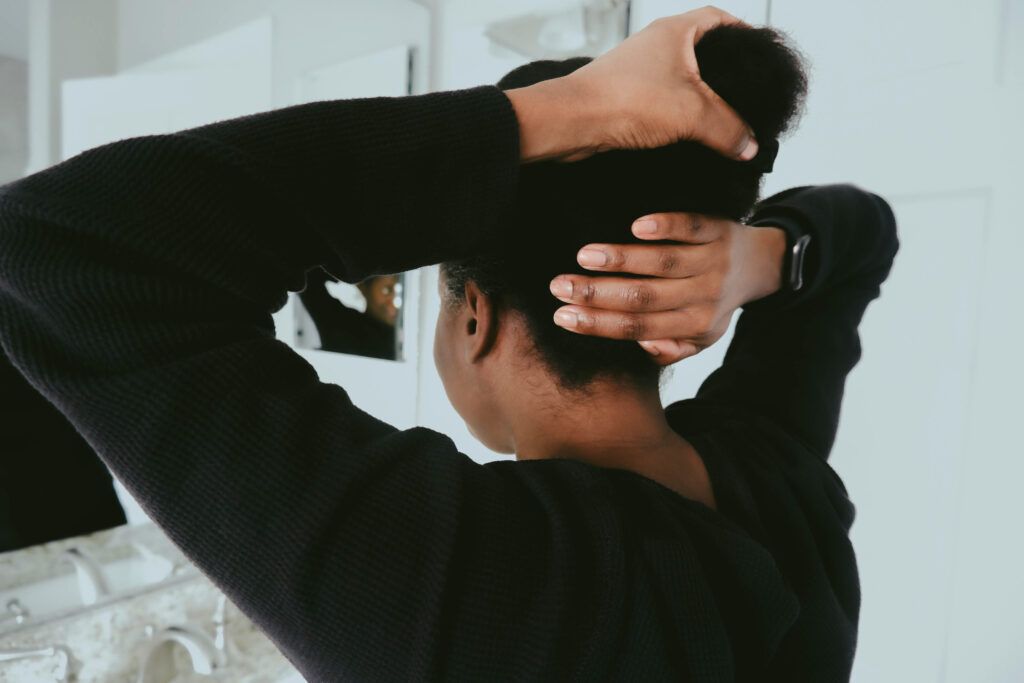Eczema, also known as atopic dermatitis, is very common and can affect people of any age. However, it’s most often associated with children.
According to the National Eczema Association, over 10% of people in the United States have some type of eczema.
Scalp eczema is a form of this condition that affects the head, particularly underneath the hair. It causes dry, irritated, and flaky skin on the scalp. It can be easily confused for seborrheic dermatitis, which is a common cause of dandruff and affects areas where the body naturally produces a lot of oil.
Knowing more about the condition, including the possible causes and what it looks like, can be very helpful in learning how to manage it.
What causes scalp eczema?

The cause of eczema is often a mix of genetics and environmental factors.
There are several possible triggers of an eczema flare-up. The most common form of eczema is atopic dermatitis. “Atopic” means the condition is due to an allergic reaction to, for example, things in the environment, like dust or certain fabrics.
In eczema, flare-ups are often caused by the body’s immune system reacting to things in the environment and creating too many inflammatory cells. This leads to the familiar symptoms of eczema — dry, irritated, itchy skin.
Things that can make symptoms worse include harsh, perfumed soaps and cleaners. This means that the type of shampoo you use could be causing your scalp eczema to flare-up.
Some other triggers of eczema include:
- stress
- cold, dry weather
- illness
- excess sweat
What are the symptoms?
Eczema most commonly affects specific areas of the body, including the inner elbows and behind the knees. But it can appear anywhere, including on the scalp and around the head and face.
Common symptoms of scalp eczema include:
- dry, flaky skin
- itching and pain
- rashes
- dandruff
Eczema can also affect different people in different ways. The skin may appear red in people with a light skin tone. On people with a darker skin tone, affected skin might be gray, brown, or darker than usual.
Seborrheic dermatitis
Scalp eczema is often confused with seborrheic dermatitis (also known as seborrhea). These conditions are very similar and have many of the same symptoms, but they have different treatments.
The main difference between eczema and seborrheic dermatitis is the causes. Researchers don’t know exactly what causes seborrheic dermatitis, but too much Malassezia yeast, a kind of fungus that grows naturally on our skin, is probably an important trigger. So, antifungals are often useful in treating it.
In babies and toddlers, the condition is also called cradle cap, and it causes thick, flaky skin on the scalp. One key difference between cradle cap and eczema is that cradle cap shouldn’t itch. It usually goes away by itself with time in young children, while it’s more likely to be long lasting in older children and adults.
If you’re not sure which condition is affecting you, you may want to speak with a doctor or a dermatologist. They can help you to choose the best treatment option.
How to treat it
There is no cure for scalp eczema at the moment, but there are several ways to manage the condition. You can use prescription and over-the-counter (OTC) medication, natural remedies, or medicinal and herbal treatments. You may want to speak with a doctor to discuss your options.
One of the simplest ways to treat eczema is by avoiding known triggers. This could mean avoiding shampoos or hair dyes that you know might be exacerbating your symptoms. Also, as stress is a common trigger, practicing mindfulness techniques, such as meditation, may help you to avoid flare-ups.
But sometimes avoiding triggers isn’t possible, or maybe you don’t know exactly what your triggers are. In that case, there are several medical options for managing your symptoms.
One of the most unpleasant symptoms of eczema is itching, which antihistamines like Benadryl can treat. These work by blocking the allergic reaction causing a flare-up and are often available OTC.
A healthcare professional might also prescribe corticosteroids, a type of medication that can reduce the body’s immune response and so reduce the symptoms of eczema. Some examples of these are:
Some more natural remedies for treating eczema, recommended by the National Eczema Association, include applying sunflower or coconut oil to affected areas and taking vitamin supplements.
Seborrheic dermatitis is treated differently from other forms of eczema. Because of the role of yeast (a kind of fungus) in this condition, doctors may prescribe antifungal creams, including:
- ketoconazole (Nizoral)
- clotrimazole (Lotrizone)
- miconazole (Desanex)
Some of these antifungals are also available as shampoos, which you can use to directly target the scalp.
As well as using prescription medication, you may want to try using herbal remedies to help with symptoms. One 2022 review of 25 studies found that several plants, including extracts from pineapples, have shown good results with few side effects in the treatment of seborrheic dermatitis.
It’s important to note that most of the studies reviewed (19) were in vitro studies, which means that the effects weren’t studied in a living organism, but 6 were clinical trials performed with human participants.
If you need help covering the cost of medications, the free Optum Perks Discount Card could help you save up to 80% on prescription drugs. Follow the links on drug names for savings on that medication, or search for a specific drug here.
